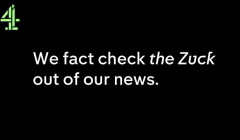
Channel 4’s fact checks the Zuck out of its news
The responsive campaign underlines the role of the news brand as a source of trusted news.

The Brooklyn Brothers’ Shelley Portet on how the industry can better support young carers

As our industry grapples with ways to be more inclusive to talent from diverse backgrounds, I’d like to put a word out there for a group that’s not often discussed – young carers.
Young carers can often miss out parts of their education, with little to no time to engage in extracurricular opportunities. This underserved, and often forgotten group in society is left feeling isolated, and lacking confidence – and yet they have so much to offer.
As a former young carer myself I know what it feels like to feel cut off from your peers growing up, blaming yourself for not keeping up with your social circle without accounting for the fact you have huge responsibilities where they have none. It can be tough and lonely, but it also made me empathetic, gave me a unique perspective on the world, and made me believe I was capable of overcoming whatever life threw at me.
This week as part of Young Carers Action Day, the Carers Trust released findings from a new survey reporting steep increases in the caring hours for young carers. Young carers reported feeling less connected and more stressed, with 41% of respondents reporting that they were concerned about their future prospects. As the after-effects of the pandemic continue to filter through, this problem is only getting worse.
It shouldn’t just fall to people like the Carers Trust to solve this issue– each and every organisation is capable of making a huge difference to the lives of young carers.
Shelley Portet, Managing Director of The Brooklyn Brothers
To complicate things further, many young carers don’t realise that they count as a young carer and so lack the support of professional bodies like the Carers Trust – this was certainly the case for me. At 14, I thought I was pretty much an adult, and definitely capable of taking on the responsibilities that fell to me when my mum (a single parent) was experiencing an MS attack or relapse. During these periods I was the primary carer for my whole family, including my younger siblings. My caring responsibilities ranged from taking care of the school run and making sure everyone ate three meals a day, to helping my mum get dressed, manage her medication, and be her emotional support while navigating the unpredictable nature of her condition.
The stress was immense, but I was fortunate enough to have a very supportive school, and times where my caring responsibilities would subside. Others are not so lucky.
The Carers Trust is campaigning for more respite opportunities for young carers, along with greater government monitoring of local authority support, and greater levels of communication between educational bodies. But it shouldn’t just fall to people like the Carers Trust to solve this issue– each and every organisation is capable of making a huge difference to the lives of young carers.
Five things your organisation can do right now to support young carers entering the workforce:
In the lead up to Young Carers Action Day I led a partnership with the Carers Trust to provide a series of workshops for young carers, giving them an insight into the world of advertising and helping them create content to tell their stories.
I will never know the person I might have been had I not experienced life as a young carer, but I wouldn’t take any of it back. And if your organisation is lucky enough to meet a young carer as they enter the workforce, you can be assured that you are meeting someone with a depth of resilience, patience, and compassion like no other.
Shelley is Managing Partner at Make It Famous at The Brooklyn Brothers. She helps brands get talked about – wherever that conversation might be happening. Shelley has led multi-award-winning social campaigns for clients that cover the full spectrum from underdog challenger brands all the way up to some of the world's most recognised brands including Adidas, McDonalds, Red Bull, GoPro, Bumble and Mini. Shelley believes that every brand has a story worth telling to the right audience.
Looks like you need to create a Creativebrief account to perform this action.
Create account Sign inLooks like you need to create a Creativebrief account to perform this action.
Create account Sign in